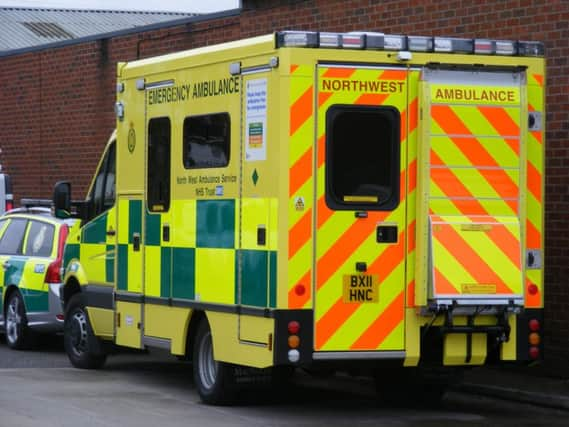Widow who died from head injuries waited three hours for ambulance


An inquest at Burnley Crown Court, however, heard that even though there were shortfalls and errors by the ambulance service that night, Mrs Christine Stafford (62) would likely have died even if an ambulance had reached her home sooner.
Mrs Stafford fell down stairs at her home in Wordsworth Street, Hapton, at 6pm on April 5th last year and received a serious head injury.
Advertisement
Hide AdAdvertisement
Hide AdThe inquest heard that a number of ambulances were despatched to Mrs Stafford during that three- hour period but were diverted to other incidents including a one-year-old with breathing difficulties and a 10-year-old boy with meningitis.
The ambulance service admitted there were “operational shortfalls” on that evening as well as “individual errors” made by operators.
Mrs Stafford eventually arrived in the accident and emergency department at the Royal Blackburn Hospital at 10.29pm where a CT scan showed she had suffered a large acute subdural haematoma.
Professor Andrew King, a neurosurgeon at the Alexandra Hospital in Cheadle, said in a statement that unless Mrs Stafford was operated on within three hours of her accident then there was “little prospect of survival”.
Advertisement
Hide AdAdvertisement
Hide AdEast Lancashire Coroner Mr Richard Taylor accepted that even in “a best case scenario” surgery could not have taken place before 10pm at the earliest.
Mrs Stafford, who had began drinking heavily following the death of her husband the previous year, telephoned her friend Joyce Nevison for help after suffering her fall around 6pm.
In a statement Mrs Nevison said: “I told her that I could not come round to her house because I do not drive and live a two hour bus journey away.
“Christine said she had just fallen, and so I called 999 for an ambulance.”
Advertisement
Hide AdAdvertisement
Hide AdThe North West Ambulance Service confirmed it received the call at 6.13pm and graded it as a “Green 2” which aims for an ambulance response within 30 minutes.
Mrs Nevison said she then received a further call from Mrs Stafford who was said to be “a bit hysterical, crying and saying she was bleeding heavily from her head”. Mrs Nevison then called 999 a second time in response to this at 6.59pm.
The ambulance service then called Mrs Nevison at 7.14pm to say there were “limited resources due to high demand” that evening.
A number of calls were made to Mrs Stafford by the ambulance service which received no response.
Advertisement
Hide AdAdvertisement
Hide AdAn ambulance was eventually despatched at 8.48pm which arrived at Mrs Stafford’s house at 9.04pm but paramedics then had to call police to gain entry.
Mrs Stafford was treated at her home by paramedics on gaining entry at 9.35pm and she was then taken to the Royal Blackburn Hospital, arriving at 10.11pm.
It was decided after consultation with specialists at the Royal Preston Hospital that Mrs Stafford was too poorly to be operated on and she died the following day.
Mr John Kilroe, a training and education manager at the North West Ambulance Service, admitted “lessons had been learned” and accepted two individual errors had been made by operators in calls made at 7.14pm and again at 8.33pm.
Advertisement
Hide AdAdvertisement
Hide AdHe said: “In the first 30 minutes there were a number of emergencies outstanding and operational shortfalls.
“The response to the call received at 7.14pm was an individual error because the operator should have passed it higher up the chain of command to the despatch manager when there was no response to a call to Mrs Stafford. It should have been escalated at that point, and would then have become a judgement call by someone of higher responsibility.
“The second individual failing came at 8.33pm when a vehicle became available but was allocated to another incident. Another ambulance did become available three minutes after that though.
“Both these operators have since received extra training. New procedures are now also in place in relation to handling third party emergency calls.”
Advertisement
Hide AdAdvertisement
Hide AdMr Kilroe added that funding has since become available for 16 emergency ambulances and the recruitment of 400 operational staff for the North West Ambulance Service.
Recording a conclusion of accidental death, Coroner Mr Taylor accepted there were difficulties faced by the ambulance service on the evening of April 5th.
He said: “There was a significant delay in the ambulance arriving at Mrs Stafford’s home due to the emergency call receiving a lack of priority.
“That delay, however, did not affect her death.”